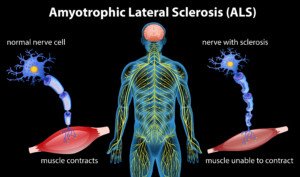
A neurologist says that ALS twitching CAN come BEFORE muscle weakness.
There is information on the Web stating that in ALS, muscle weakness comes before twitching (fasciculations).
To know that muscle weakness begins appearing prior to any twitching can be a big source of reassurance to people who are literally trembling with fear that they may have the incurable motor neuron disease known as amyotrophic lateral sclerosis.
In the research I’ve done for my articles, I was not satisfied with the information I was finding pertaining to whether or not the muscle twitching in ALS preceded the weakness.
So I decided to ask a neurologist this simple question:
Can the twitching (fasciculations) of ALS precede the pathological weakness in the muscles?
“Muscle weakness and cramps can either precede twitching or twitching can precede muscle weakness and cramps,” says Bonnie Gerecke, MD, director of the Neurology Center at Mercy in Baltimore.
To read that is a blow to men and women who spend inordinate amounts of time ruminating that they might have this devastating condition.
“There is no absolute paradigm for the disease,” says Dr. Gerecke. “A patient can experience muscle twitching (fasciculations) as an initial sign or symptom of ALS, although weakness usually follows shortly thereafter in this case.
“It should be kept in mind that many individuals who experience muscle twitching do not develop ALS, as muscle twitching can be benign.”
ALS is a very rare illness, whereas benign fasciculations are part of being human; they are exceedingly common and have many harmless causes such as:
Health Anxiety

Freepik.com/pressfoto
General Anxiety

Shutterstock/T.Den_Team
Dehydration

A Hard Workout

Freepik.com
Mineral Imbalance

In fact, it may very well be that anxiety causes the twitching to gear up the body for a fight or flight.
In a sense, the muscle fibers are on standby to fight or flee—kind of like engines revving up for the big race.
But if that fight or escape never comes…but the anxiety persists, the muscles may remain in a twitching or revving-up mode for extended periods.
Dr. Gerecke continues, “Conversely, a patient with ALS may develop muscle weakness and cramps prior to the onset of twitching, and not all individuals with ALS develop twitching.
“Muscle weakness and cramps can also be due to many other conditions.”
Fact is, a hefty number of conditions cause weakness in the muscles.
And the weakness can manifest in different ways.
It can be gradual; it can be rapid or sudden; it can be accompanied by severe pain or be painless; it can come only after intense exercise and be temporary.
Cramps in the legs are often caused by dehydration, but can also come from an assortment of non-neurological conditions, such as inflammatory bowel disease.
Bottom line: There is no rule that the twitching in ALS necessarily comes before or after any muscle weakness (or cramps).

Dr. Gerecke has a special interest in ALS, myasthenia gravis, myopathy/muscular dystrophy, peripheral neuropathy and radiculopathy. She is board certified in general neurology and neuromuscular medicine.
 Lorra Garrick has been covering medical, fitness and cybersecurity topics for many years, having written thousands of articles for print magazines and websites, including as a ghostwriter. She’s also a former ACE-certified personal trainer.
Lorra Garrick has been covering medical, fitness and cybersecurity topics for many years, having written thousands of articles for print magazines and websites, including as a ghostwriter. She’s also a former ACE-certified personal trainer.









































